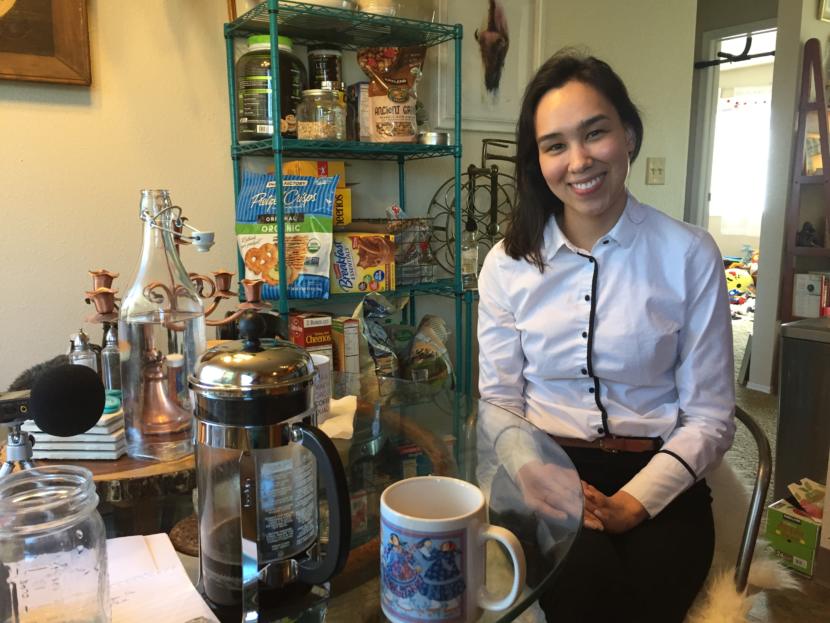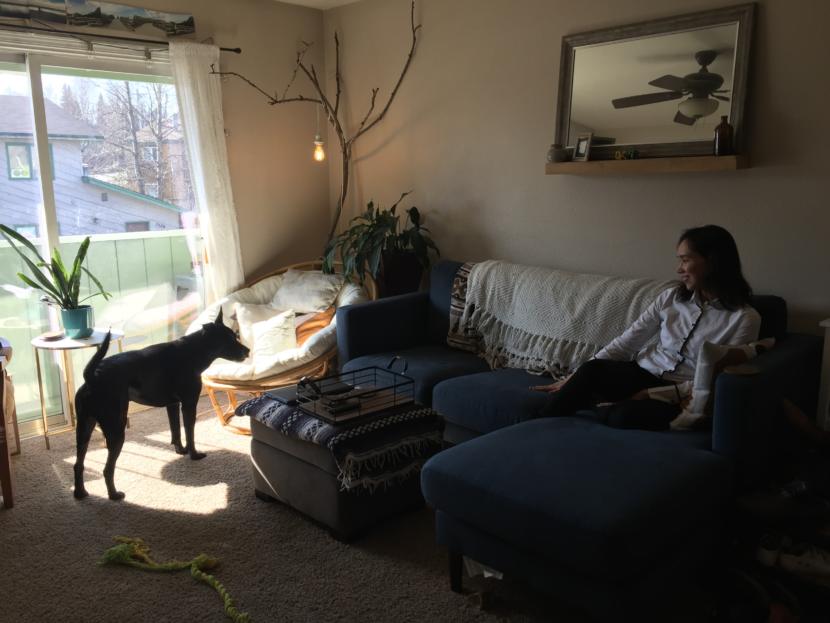
If you look at the stories being told in the world, and you don’t see your perspective reflected in those stories, what do you do?
For one young Iñupiaq woman, the answer to that question was: make a podcast.
Alice Qannik Glenn met me at the bottom of the stairs leading up to her apartment in Anchorage, her wiggling, black-and-white mutt named Kumak at her side. Her apartment is cozy: full of light and plants, with colorful paintings and prints on the walls. And for the better part of a year now, it’s not only been her home, but also her makeshift recording studio.
“I’ve done a couple of interviews here where we’re just kind of chilling on the couch,” she said, gesturing at her living room. “Most of the time we talk in here,” she continued, leading me back to her small kitchen, where a french press full of coffee and some snacks were waiting for us on a round glass table in the corner.
It’s fitting that Glenn often tapes her podcast in her kitchen. It’s called “Coffee & Quaq.” (“Quaq” is the Iñupiaq word for frozen or raw meat or fish.)
It’s not a food podcast necessarily, though she does have one episode that focuses on Native foods. The podcast’s purpose is much broader: “To celebrate, share, and explore the collective experience of contemporary Native life in urban Alaska.”
Glenn grew up in Utqiaġvik, but has lived in Arizona, Florida and, for the past few years, in Anchorage.
She wanted the title of her podcast to evoke both the contemporary and the traditional parts of Alaska Native life. But she said that coffee and quaq don’t go together literally, a fact that made her dad skeptical about the name when she told him.
“He’s like, ‘Tea and quaq. We don’t drink coffee with quaq, Alice,'” she remembered, laughing. Still, she liked the symbolism — coffee has the added connotation of staying “woke,” which she hoped the podcast conversations would help both her and her listeners do — so she kept it.

Glenn just turned 30 this year, and she said she was inspired to make the podcast because she didn’t see stories being told in the media from the perspective of young Alaska Native people.
That’s a big deal, she said, because when you don’t see yourself reflected in the narratives put out into the world, it’s easy to internalize the message that you don’t matter.
She wants “Coffee & Quaq” to provide that missing representation: to spotlight the ideas and conversations of young Alaska Native people. She also wants it to broaden the range of stories that are told about Indigenous experiences.
“We’re often defined by our disparities, some of the struggles that we’re going through, and I don’t want that,” she said. “Yes, those stories need to be told. But also, many of us are happy, many of us are thriving, many of us are doing great things, and hopefully those highlights can inspire other young Native people to do the same.”
In one episode of her podcast, she talks with two young Alaska Native women — one an artist, the other an artist and curator — about cultural appropriation. In another, she digs into why some Arctic Native people don’t like to use the word “Eskimo” to describe themselves, and even find it offensive.
Glenn said these interviews have been a continuing education for her: a way to engage with important topics and deepen her own thinking by listening to the insights of others.
It isn’t her full-time job yet, but she wants it to be.
“It just feels like magic,” she said. “It’s what I think about when I wake up in the morning, and it’s what I think about when I go to sleep.”
Glenn has a range of interests career-wise: She went to college for aerospace studies, which she said she might go back to one day. But for right now, she’s looking for ways to make the podcast the thing she does 24/7.